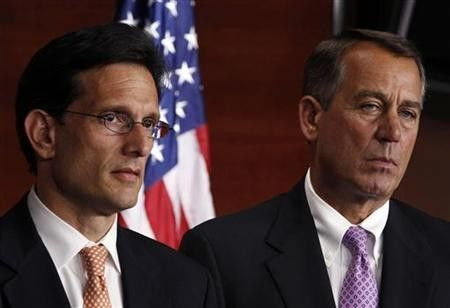U.S. Debt Deal: How GOP's 'Young Guns' Created the Tea Party Rebellion

The Washington Post published a remarkable piece on Thursday detailing how a debt deal showdown that engulfed Washington and fractured the Republican Party was the direct result of ascendant Republican lawmakers, the self-proclaimed "Young Guns," who recruited Tea Party freshmen and then targeted the debt ceiling as a key strategic opportunity.
As Speaker John Boehner, R-Ohio, scrambled to strike a deal under the looming threat of national default, he faced an insurrection within his party's ranks. Rank-and-file Republicans were resisting any deal that raised any taxes and did not cut deeply enough for their liking, and they helped to torpedo several compromises that would not satisfy their demands.
Their weapons included using a listserv that circulated e-mails with subject lines such as: "Let's keep promoting [Cut, Cap and Balance plan] and bashing the McConnell-Reid plan," "Let's kill Gang of Six today. Today. Dead." and "Today is the day to kill the Boehner deal." Some said they would not vote to raise the debt limit under any circumstances.
The Republican Party is known for its ability to unify behind an issue, so the tenor and scope of the pushback was startling. But it should not have been entirely unexpected.
The foundation was laid years ago, when a trio of rising Republican stars -- Reps. Eric Cantor of Virginia, Kevin McCarthy of California and Paul Ryan of Wisconsin -- began a push to revitalize a beleaguered Republican Party by recruiting members who hewed to an unyielding ideology of curtailing the federal government, according to The Post's account.
Adopting the "Young Guns" title bestowed upon them by a magazine feature, the three lawmakers set about finding potential lawmakers who fit the mold, rewarding promising candidates with cash and support. That, and an early recognition of the Tea Party movement's potency, helped the Young Guns to rebuild a substantial House majority in 2010.
From the beginning, Cantor pushed the impending need to raise the debt ceiling as an opportunity to exert opposition to government spending. And Boehner saw a potential crisis looming.
"I've made it pretty clear to them that as we get into next year, it's pretty clear that Congress is going to have to deal with" the debt limit, Boehner told reporters on Nov. 19, 2010, two weeks after his party recaptured the House. "We're going to have to deal with it as adults. Whether we like it or not, the federal government has obligations, and we have obligations on our part."
But a new wave of 87 Republican freshmen had ridden to power opposing the budgetary expansion that a debt ceiling raise represented, and they were not ready to capitulate -- not to Democrats nor to their own party's leadership. They were helped along the way by Cantor, who repeatedly invoked the leverage they would have with the debt ceiling. Cantor was also instrumental in undercutting the "grand bargain" outlined by President Barack Obama and Boehner, arguing that repealing tax breaks would be unacceptable for the emboldened freshmen.
As the nation veered closer to the brink of financial disaster, it became difficult for leadership -- even the Young Guns -- to convince the freshmen of the consequences of failing to raise the ceiling.
"Leaders like me would try to tell them: 'Look, no, really, we think it could be bad,'" Ryan told The Post. "They'd look at it with suspicion. ... If there was any semi-credible source saying default wouldn't be so bad, they clung to that."
In the end, Democrats acceded to a deal that includes deep spending cuts but no specific calls for new revenue (that revenue may be included by a 12-member special committee tasked with reducing the deficit by about $1.5 trillion). It was a victory for the Tea Party members, and a sign of how Democrats had miscalculated their clout.
"Would Democrats have ever agreed if they thought the new freshman class was going to roll over? No. The freshmen made our hand so much stronger," McCarthy told The Post. "You had a fear of how far they would go. I'm sure the President looks back, too, and was fearful. But in negotiations, isn't that the best thing?"
© Copyright IBTimes 2025. All rights reserved.




















